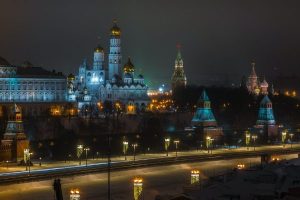Russia’s Internet Censorship is a Wake Up Call
 With Russia’s Invasion of Ukraine, censorship of social media in the country continues to tighten. On March 4, the Russian government blocked Facebook and put heavy restrictions on Twitter in hopes of hiding the political truth about what’s happening across their border from their citizens. This is no surprise from a country that hampers freedom of speech. In fact, before the war started, thirteen of the world’s largest tech companies, including Apple, Google, Meta, Twitter and Telegram, were grappling with a troubling Russian regulation just put into effect on January 1 of this year. It didn’t receive half the press a blocked Facebook and restricted Twitter got. It should have though, because it’s dangerous.
With Russia’s Invasion of Ukraine, censorship of social media in the country continues to tighten. On March 4, the Russian government blocked Facebook and put heavy restrictions on Twitter in hopes of hiding the political truth about what’s happening across their border from their citizens. This is no surprise from a country that hampers freedom of speech. In fact, before the war started, thirteen of the world’s largest tech companies, including Apple, Google, Meta, Twitter and Telegram, were grappling with a troubling Russian regulation just put into effect on January 1 of this year. It didn’t receive half the press a blocked Facebook and restricted Twitter got. It should have though, because it’s dangerous.
Federal law No. 1176731-7, otherwise known as the “landing law”, requires any foreign entity (website, software, information systems) with over 500,000 users to have a local leader in Russia and/or have offices in the country. Further, the businesses must create an electronic form for Russian citizens and other entities to easily file complaints and are required to register with Roskomnadzor – the national agency that controls Russian media.
While it’s not clear whether the landing law applies to adult sites/platforms as well, it’s another example of countries around the world clamping down on social media sites – France and UK with their age verification rules, Australia with its Online Safety Act, the US with SESTA/FOSTA and most recently Germany which banned adult content on Twitter as reported on by YNOT. Deeply concerning, the regulation opens tech companies to retaliation by the Russian legal system and threatens freedom of speech.
Article 19, an organization which works with the United Nations and regional bodies for a free media, not only called for Putin to reject the landing law which is somewhat laughable considering his widely known stance on controlling information with an iron fist (especially after the invasion of Ukraine), but also asked tech companies to resist. This puts the platforms in a precarious position between keeping their content free and private for their users or doing business in the country. So far, Apple, TikTok and Spotify have all agreed to abide by the rule while Twitter, Twitch and Telegram have not, according to The New York Times.
Making it even more difficult, in addition to abiding by the landing law, social media companies are also forced to adhere to other Russian edicts from December 2020, which forbid content such as “information insulting to the Russian society, State, constitution, state symbols and state authorities,” “calls for participation in public disorders or extremist activities,” “disinformation of public importance” and more. Failure to comply incurs heavy fines.
As reported on by the Times, the tech companies are constantly faced with pressure from more and more countries around the world wanting to tighten the noose around a free internet. Where it used to be only China that was heavy-handed with censorship, now it’s Russia, Turkey, Belarus and Myanmar and most concerning, as mentioned earlier, the western countries are getting in on the game with regards to restricting adult content. These powerful tech companies have a choice, cave to monetary interests, or fight for a free internet.
Pavel Chikov, a human rights lawyer interviewed by the Times said “There have been times when the big tech companies have been leaders in terms of not only technology but also in civil liberties and freedom of expression and privacy. Now they behave more like big transnational corporations securing their business interests.”
Those who support the Freedom to Speak and the Freedom to Know (Article 19’s mantra) fight back with protests, installing VPNs (virtual private networks) and finding any way possible to gain access to government black-listed content but until the tech companies, the ones with the true power, decide to forgo the mighty dollar and refuse to abide by censorship rules the slippery slope into a heavily regulated internet across the globe continues.
Image by Дмитрий Трепольский from Pexels












